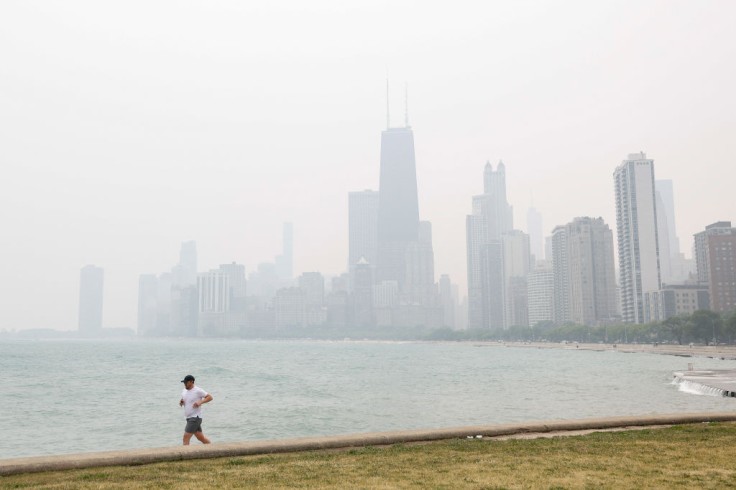
Chicago, known for its iconic skyline and vibrant atmosphere, finds itself with the world's worst air quality due to the Canadian wildfire.
The city is grappling with what has been declared the world's worst air quality as smoke from Canadian wildfires engulfs the region.
Hazy, smoky skies have settled over the city and surrounding areas, triggering air quality alerts and raising concerns for public health.
Air Quality Plunges as Canadian Wildfire Smoke Descends
The Midwest region, including Illinois, Wisconsin, Michigan, Iowa, and Ohio, has experienced a significant deterioration in air quality due to the impact of raging wildfires in Canada.
According to The Chicago Tribune, on Tuesday, Chicago, the bustling metropolis on Lake Michigan, bore the brunt of this environmental crisis, with the city recording the worst air quality in the world.
The air quality index in Chicago reached the "very unhealthy" category for all age groups, echoing the haze and unhealthy conditions previously witnessed in New York City.
Local authorities, including Chicago Mayor Brandon Johnson, are closely monitoring the situation and taking precautionary measures to protect residents.
In response to the alarming air quality levels, the Illinois Environmental Protection Agency issued an air quality alert in effect until midnight Wednesday.
Chicago residents have been strongly urged to limit their time outdoors, particularly individuals belonging to sensitive health groups such as children, teens, seniors, and those with heart or lung diseases.
Mayor Johnson emphasized the importance of avoiding strenuous activities and following recommended guidelines to minimize exposure to hazardous air.
As the poor air quality is expected to persist, city officials are implementing various strategies to aid residents during this challenging period.
Public buildings are being utilized to provide relief from the smoky air, mirroring the approach taken during extreme weather conditions like heat waves and cold snaps.
Furthermore, companies and organizations are encouraging employees to work from home, and programs and events are being relocated indoors or canceled altogether to reduce outdoor exposure.
According to Reuters, the source of Chicago's air quality woes lies thousands of miles away in Canada, where an unprecedented wildfire season is wreaking havoc.
Emissions from approximately 400 wildfires burning across eastern and western Canada have cast an orange haze over major metropolitan areas in the United States, including New York City, Boston, Philadelphia, and Washington, D.C.
Health Risks and Urgent Precautions
Health experts and doctors are urging residents and visitors to exercise patience and take the necessary precautions to safeguard their well-being.
According to NBC News, wearing N95 or KN95 masks is highly recommended for individuals spending extended periods outdoors.
Dr. Juanita Mora of the American Lung Association highlights the importance of regular medication intake for those with pre-existing respiratory or cardiovascular conditions, emphasizing that the smoky conditions could have comparable health effects to smoking half a pack of cigarettes in a single day.
Northwestern health experts have underscored the gravity of prolonged exposure to the smoky conditions, reinforcing the need for vigilance and proactive measures.
Chicago City Hall has called upon residents to check on their neighbors, following the city's tradition of community support during times of extreme weather events or crises.
While relief may be on the horizon, a potential disturbance in the western United States could bring severe weather conditions to Chicago on Thursday.
As the city navigates through this challenging period, officials remain committed to raising awareness, implementing strategies for residents' well-being, and providing timely updates regarding air quality improvements.
Chicago, once again making headlines, finds itself at the center of a pressing environmental concern.
The world's worst air quality, caused by Canadian wildfires, poses significant challenges for the city and its inhabitants.
With concerted efforts, vigilant precautions, and community support, Chicago strives to overcome this crisis and restore clean, breathable air to its streets and neighborhoods.